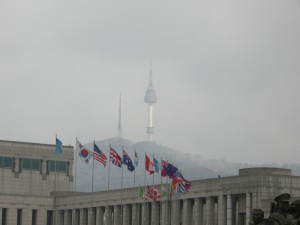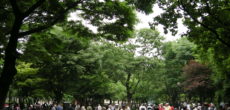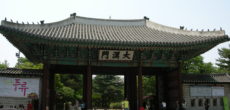
Flags at Korean War Memorial Museum
National and Public Holidays in Korea. Korea like most other countries follow the Gregorian calendar (Western Calender). In Korea there are 10 public holidays with days off and other holidays with no days off. During the official public holidays most offices and banks are closed. Shops and restaurants usually stay open as well as most museums. The museums will usually close the day after the holiday.
The two most important holidays in Korea are Seollal and Chuseok.
New Year’s Day (신정):
This day is a public holiday and is held on January the 1st. It is called Sinjeong in Korean.
Korean New Year’s Day (설날):
This holiday is called Seollal in Korean. It is held on the first day of the lunar calendar. This is the same system that is used in China. The holiday dates change each year and are held in January or February. The holidays are 3 days long. The holiday is a very family orientated time of year. Businesses are closed and people return to their hometowns to visit family.
Independence Movement Day (3.1절):
This is held on March 1st every year and celebrates the start of the movement against the Japanese on March 1st, 1919. The declaration of independence was first read at Tapgol Park in Seoul. Every year on this day they have a special ceromeny and read the declaration. This day is called Samiljeol in Korean.
Children’s Day (어린이날):
This day is called Orininal in Korean and is held to wish success for their children’s future. Usually parents dress their children up in nice clothes and take them out for the day to places like the zoo and parks. Children’s Day in Korea is held on May 5th.
Buddha’s Birthday (석가탄신일):
Buddha’s Birthday is called Seokgatansinil in Korea. It is celebrated in many Asian countries and held on the 8th day of the 4th lunar month, usually April or May. In Korea many lotus lanterns are decorated on temples and on the streets.
Memorial Day (현충일):
Memorial Day in Korea is held on June the 6th every year. It is to commemorate men and woman who gave their lives for their country. There is a special ceremony held at Seoul National Cemetery.
Liberation Day (광복절):
Liberation day is held on August the 15th ever year. It is called Gwangbokjeol in Korean. This day commemorates Korea’s Independence from Japan. Japan accepted and signed the allie’s terms of surrender and Korea gained it’s independence.
Chuseok (추석 Mid-Autumn Festival):
This is the most important holiday in Korea alongside Seollal. The holiday is held every year for 3 days on the 15th day of the 8th lunar month, usually in Mid or Late September or early October which is rare. The holiday is to celebrate a good harvest and most people return home and visit their parents or relatives.
2011: September 12
2012: September 30
2013: September 19
2014: September 8
2015: September 27
2016: September 15
2017: October 4
2018: September 24
The day before and after Chuseok are legal holidays in Korea.
National Foundation Day (개천절):
This day celebrates the first Korean state founded on the 3rd day of the 10th lunar month in 2333 B.C. National Foundation Day is called Gaecheonjeol in Korean.
Christmas Day (기독탄신일):
In South Korea christianity is one of the two major religions. The day is called Gidoktansinil or Seongtanjeol in Korean.
Special days in Korea:
These are not public holidays.
Labour Day:
Labour Day is held on May 1st. Although Labour Day is not a national holiday, banks and business establishments are closed and many people enjoy a day off.
Parent’s Day:
This is not a public holiday. People show their love and respect for their parents. Korea does not have a Father or Mother’s day so it is celebrated on Parent’s Day.
Constitution Day (제헌절):
Constitution Day is held every year on July 17th and is called Jeheonjeol in Korean. This day celebrates the day that the proclamation of the constitution of the Republic of Korea was made in 1948.
Armed Forces Day (국군 의 날):
This is not a national holiday or day off but is a National Flag Raising Day. This day recognise and honours the veterans of the military forces of the Republic of Korea
Hangul Day (한글날):
This day celebrates the invention of Hangul in 1443. Hangul is the Korean alphabet and many Koreans are proud of it. Hangul day is held on October 9th.



